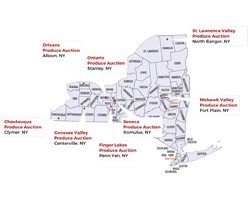NYS Produce Auctions Locations and Contact Information
Judson Reid, Extension Vegetable Specialist
Cornell Vegetable Program

Produce auctions in New York State have been formed so that produce growers have a way of marketing their product to quality minded buyers through open competitive bidding. A map of produce auction locations across the state is provided along with auction days, times, and contact information.
Chautauqua Produce Auction
7844 Rt 474, Clymer, NY 14724
716-355-6500; 716-355-6391
nwesterberg@stny.rr.com
www.chautauquaproduceauction.com
Finger Lakes Produce Auction
3691 Rte 14A, Penn Yan, NY 14527
315-531-8446
www.fingerlakesproduceauction.com
Genesee Valley Produce Auction
8855 Cty Rd 3, PO Box 163, Centerville, NY 14029
585-567-8640 auction days from 8:30 AM
585-567-4312 8:00-8:30 AM all other days
Mohawk Valley Produce Auction
840 Fordsbush Rd, Fort Plain, NY 13339
518-568-3579
Ontario Produce Auction
4860 Yautzy Rd, Stanley, NY 1461
585-526-5708
www.ontarioproduceauction.com
Orleans Produce Auction
12590 Ridge Rd, Albion, NY 14411
585-798-5466
Seneca Produce Auction
2033 Yerkes Rd, Romulus, NY 14541
712-432-8598 market report
607-869-9317 Mose Fisher Jr
St. Lawrence Valley Produce Auction
25 Martin Rd, North Bangor, NY 12966
518-483-2300
Read more information about how to buy goods at a produce auction.
NYS Map of Produce Auction Locations and Contact Information (pdf; 1336KB)

Upcoming Events
Vegetable Pest and Cultural Management Field Meeting for Auction Growers -- Ontario Produce Auction
July 15, 2025
Stanley, NY
This evening meeting will demonstrate pest management in fresh market vegetables in both field and greenhouse (high tunnel) vegetables, primarily for those growing for wholesale auction. A hands-on demonstration of weed, insect and disease identification in vegetables including management options. Details on each topic will focus on field observations at the farm.
Orleans Summer Vegetable Meeting, 2025
July 16, 2025
Waterport, NY
Meeting themes are pest management in a wide array of produce and best practices for pesticide use. Professor Brian Nault will cover allium leaf miner and thrips in onions, garlic, and leeks, and discuss insect challenges in other crops. Bring your questions! We'll also have a field walk that includes high tunnel tomato and cucumber.
DEC credits available: 0.5 in CORE plus either 1.25 in 1a and 23, or 0.75 in 24.
Vegetable Pest and Cultural Management Field Meeting for Auction Growers -- Finger Lakes Produce Auction
July 18, 2025
Penn Yan, NY
This evening meeting will demonstrate pest management in fresh market vegetables in both field and greenhouse (high tunnel) vegetables, primarily for those growing for wholesale auction. A hands-on demonstration of weed, insect and disease identification in vegetables including management options. Details on each topic will focus on field observations at the farm.


































